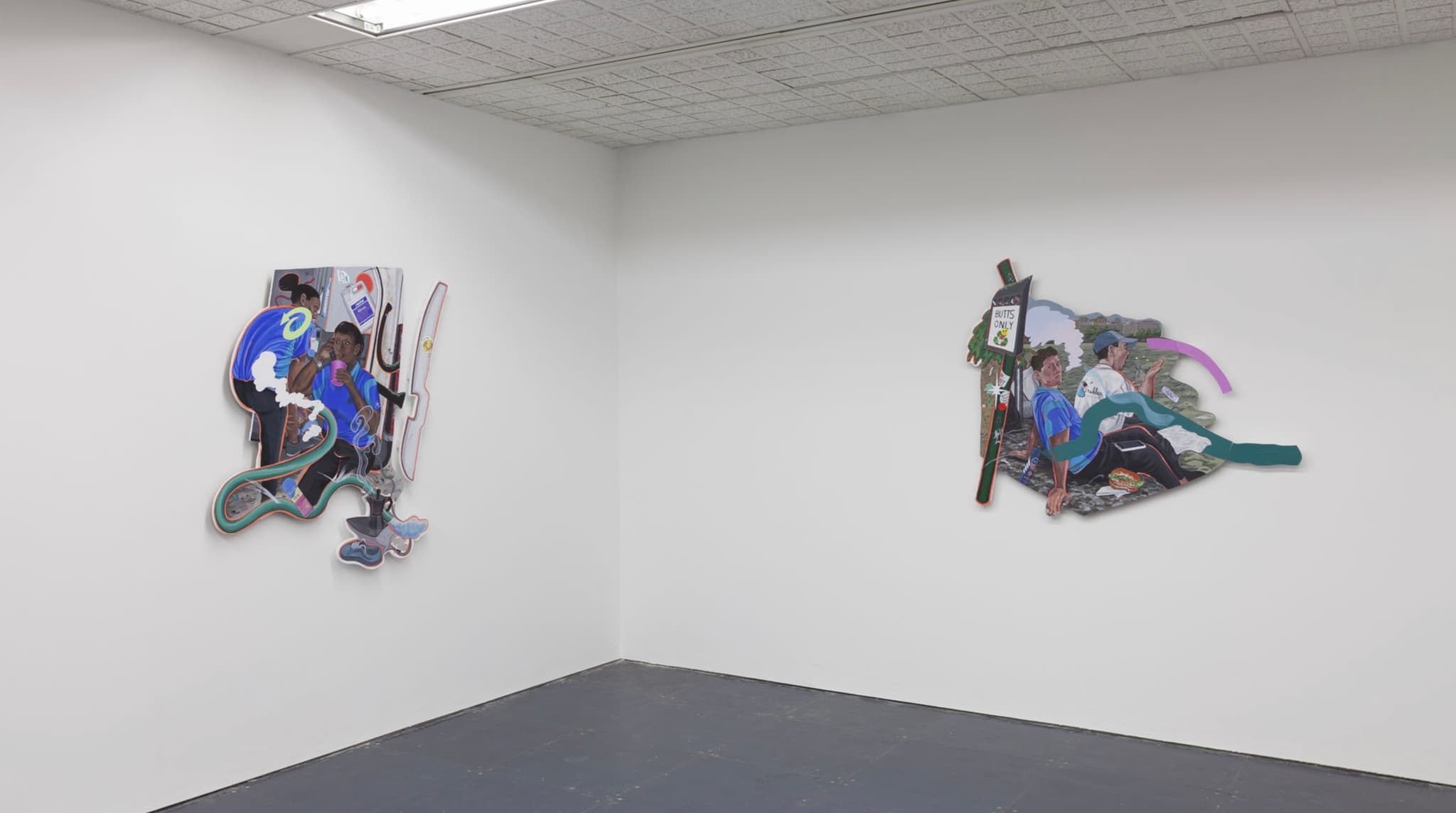Review: Flo Brooks, Scrubbers at Project Native Informant, London
December 2018

This suite of five paintings tracks the movement of workers employed by a fictional commercial cleaning company called Scrubbers, the name giving the exhibition its title. Because of the narrative established through this cast of characters and the flattened style of figuration Brooks achieves in his use of acrylic paint, something cartoonish lingers at the edges, a quality accentuated by the use of oddly shaped wooden boards as surface. But in tracing the objects and references that move across each work, any risk of lapsing into cute, poppish gimmickry is halted. While I previously associated Brooks with the tropes Bob Dickinson and Maria Walsh both recently identified as a new sincerity in art (Features AM420), there seems to be a shift in the new work. The paintings of Brooks's friends and family, which dominated his exhibition at Cubitt last year, seemed akin to the concerns of other contemporary figurative painters, including Jordan Casteel and Aliza Nisenbaum, but here, because of Brooks's leap into portraying an imaginary host of characters, his work seems to have gained a more fantastical quality and a stronger sense of negativity.
Each painting deals with a particular space and therefore suggests a set of relations between the cleaners and the publics they encounter. We see the employees of Scrubbers working in a public toilet, a gym and a therapist's consulting room - cleaning mirrors, poles and glass - while other figures pump iron or take a piss. Elsewhere, the cleaners take a break by the banks of a river in Butts Only, or pause for a moment to shave their legs or make a phone call in what looks like an institutional locker/break room in I'm here, but only for a minute. While the title Butts Only (that's the sound that lonely makes) sounds a little like a lost house music classic, the painting itself presents a set of acerbic references to sexuality, gender and nationhood. The titular phrase is emblazoned across a cigarette bin, from which a single finger protrudes from the grille, rendering this trash facility into something like a glory hole. A sticker with a Union Jack reads 'Brexit' and, below, 'March for a People's Vote' adorns the pole supporting the bin. Further down, the phrase 'Harder Daddy' is situated next to paintpen tags. Two figures lounge next to each other, their legs dangling over the edge of the riverbank. One vapes and turns towards the viewer, presumably taking a break from the half-eaten hamburger resting on a serviette next to him. Facing away from the viewer and towards the river, the other figure wears a branded 'Scrubbers' shirt and pops pills, one of many mentions of pharmaceuticals in the exhibition that perhaps refer to Brooks's own transition.

In the similarly punning title of U Bend but it's still a trap, the subterranean level of the painting begins with that piece of plumbing, descending from a sink where a figure splashes his face, washing off Gillette shaving foam while being blasted with hot air from a hand dryer on top of which lies a bottle of poppers. In the lower levels of the paintings we see drains, shit, toilet roll and pills suspended in the pipe's fluid. Arrows point to each other, prompting a simmering anxiety about blockages, overflows, floods. Floating next to the pipe, a packet of contraceptive pills and a spray designed to tackle black mould seem to echo sensationalist news stories with quasi-transphobic implications about contaminated water and its impact on hormones; as a July 2017 Daily Mail headline proclaimed, 'Contraceptive pills and cleaning products that are flushed down the toilet are turning one in five male river fish transgender. Up above, behind the figure shaving, one of the cleaners wipes the mirror, another person gets changed and another pisses into a barely visible urinal, a tub of 'Aggressor' cleaning fluid by his feet. Like the pole that supports the cigarette bin and bisects Butts Only, here another pole, topped by a pink menstrual cup, and a stack of Pringles divides the space between the figure in the urinal and the figure getting changed. To detail all the references to sexuality and gender that are constantly imbricated with cleanliness and hygiene here is beyond the scope of this review, yet U Bend never becomes overburdened or feels jaded in its references.
In Mass Mutation, however, situated adjacent and set in the gym, the pile-up of such signifiers appears more cluttered. This is less a numerical issue of one too many protein shakes or grafittied penises but rather because of the spatial composition of the painting where each figure comes to occupy the same passage, and the device of poles and pipes as dividers works less successfully in creating a strong figure/ground relation. Similarly, while in Butts Only Brooks's use of abstract squiggles across the picture plane coheres with the shape of the wooden support to produce a sense of dynamism, in Mass Mutation the same devices seem more arbitrary.
As a whole, the exhibition impressively conjures a fraught and hyper-specific set of relations between labour, gender, sexuality, the state, hygiene and health that feel firmly rooted in our present moment without appearing contrived or at risk of impending redundancy. Similarly, while Brooks's work clearly overlaps with a renewed tradition of figurative painting concerned with these themes, it also reaches back to older models and those outside the sphere of fine art: the pipes and turds echo Philip Guston, and the gross-out combination of waste and hygiene evoke the cartoonish, tactile covers of children's Goosebumps books.
Larne Abse Gogarty is a writer, and lecturer in history and theory of art at the Slade School of Fine Art, UCL